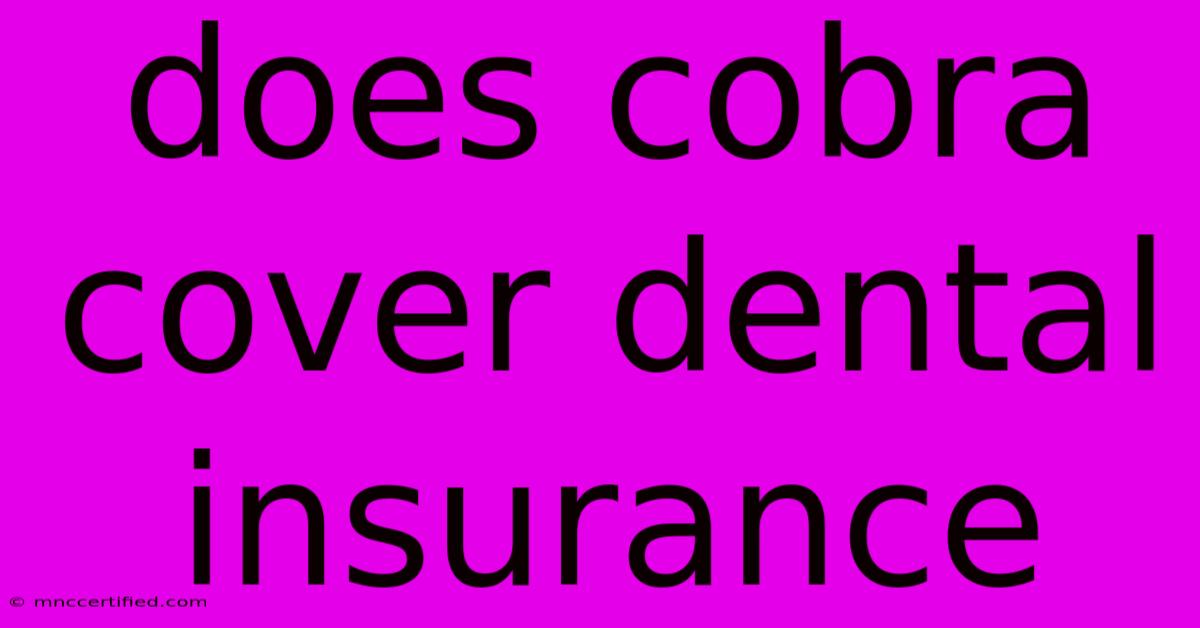Does Cobra Cover Dental Insurance

Table of Contents
Does Cobra Cover Dental Insurance? A Comprehensive Guide
Many people rely on their employer-sponsored health insurance, and losing that coverage can be stressful. The Consolidated Omnibus Budget Reconciliation Act (COBRA) offers a lifeline, allowing you to continue your health insurance coverage for a limited time after experiencing a qualifying event. But does COBRA cover dental insurance? The answer isn't a simple yes or no. Let's delve into the details.
Understanding COBRA and its Coverage
COBRA is a federal law that mandates employers with 20 or more employees to offer continued group health insurance coverage to employees and their dependents who lose their coverage due to certain qualifying events. These events typically include:
- Job loss: This is the most common reason for needing COBRA.
- Reduction in work hours: If your hours are reduced to the point where you're no longer eligible for employer-sponsored insurance.
- Death of the employee: Dependents can continue coverage.
- Divorce or legal separation: Spouses and dependents may be eligible.
- Loss of dependent status: For example, if a child ages out of dependent coverage.
While COBRA generally covers medical, hospital, and surgical insurance, it doesn't automatically include dental insurance. This is because dental insurance is often considered a separate benefit, distinct from medical insurance offered under the same employer plan.
When COBRA Might Cover Dental Insurance
The crucial point to understand is that COBRA coverage depends on the specific terms of your employer's group health plan. If your employer's plan includes dental coverage as part of the overall group health plan, then COBRA may extend that dental coverage as well. However, if dental coverage is offered as a separate plan, COBRA will likely not extend that coverage.
Think of it this way: If your dental insurance is bundled with your medical insurance through one plan, COBRA might cover both. But if you have a separate dental insurance policy through your employer, that separate plan likely won't be covered by COBRA.
To find out definitively whether your dental insurance is covered under COBRA:
- Review your Summary Plan Description (SPD): Your SPD is a document that outlines the details of your employer's health insurance plan. It should clearly state what benefits are included and whether dental coverage is part of the overall plan.
- Contact your employer's human resources department: They can provide clarification on your specific plan and whether dental coverage is extended under COBRA.
- Contact your insurance provider directly: They can confirm what aspects of your coverage are continued under COBRA.
Alternatives to COBRA Dental Coverage
If your dental insurance isn't covered by COBRA, don't despair. Several alternatives exist:
- Individual dental insurance plans: You can purchase an individual dental insurance plan directly from an insurance company. Research different providers to find a plan that suits your needs and budget. Compare premiums, deductibles, and coverage levels carefully.
- Dental discount plans: These plans offer discounts on dental services but don't function like traditional insurance. They can be a cost-effective option, especially for routine care.
- Medicaid or Medicare: Depending on your income and eligibility criteria, you may qualify for dental coverage through government programs.
Keyword Optimization and SEO Strategy
This article uses several relevant keywords and phrases strategically throughout the content, including: COBRA dental insurance, does COBRA cover dental, COBRA coverage, dental insurance coverage, employer-sponsored dental insurance, COBRA benefits, Summary Plan Description (SPD), individual dental insurance, dental discount plans. The use of headers, bold text, and a clear structure enhances readability and improves SEO. Off-page SEO strategies would include promoting this article through social media, relevant forums, and guest blogging opportunities related to health insurance and dental care. Building high-quality backlinks to this article is crucial for long-term ranking success on Google. Remember to continually monitor search engine results and adjust your keyword strategy as needed to optimize for evolving search trends.

Thank you for visiting our website wich cover about Does Cobra Cover Dental Insurance. We hope the information provided has been useful to you. Feel free to contact us if you have any questions or need further assistance. See you next time and dont miss to bookmark.
Featured Posts
-
Ringworm Infections Rise After Skin Fades
Nov 23, 2024
-
Clement Prioritizes Points Performance
Nov 23, 2024
-
Erasmuss Approach Springbok Player Performance
Nov 23, 2024
-
Bestonroad Trading Limited Review
Nov 23, 2024
-
Insuring A Car Owned By A Trust
Nov 23, 2024